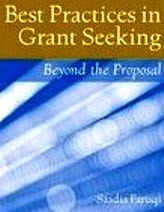Let's admit, we all make mistakes from time to time. But when it comes to writing grant proposals, even little errors can end up being very costly. Here are some small mistakes that can push your proposal into the trash can:
Ignoring Instructions: Many grant writers think their proposal is so great that the reviewer or program officer will forget about the little things. Or that it is appropriate to pick and choose which instructions to follow and which to ignore. To make sure that absolutely no instruction is being ignored, ask yourself the following questions: Am I sticking to the stated page limit? Have I included all required attachments? Are my topic headings in the same order as in the proposal guidelines? Have I answered every question? Will I be able to submit the proposal by the deadline?
Not proofreading: Another mistake made by mostly seasoned grant writers is not proofreading the final proposal. They may think they are such good writers they don't need another set of eyes. Consider these issues before submitting the proposal: Did I read each and every word of the final draft? Did I check for typos not caught by Microsoft Word (e.g. fist instead of fast or my instead of may)? Did I make sure that page numbers are included?
Including Technical Jargon: Grant writers sometimes forget that the proposal is not a technical manual; it may be read by proposal officers who are not as well-versed in the subject matter as nonprofit staff. The easiest way to ensure that a proposal is rejected is to fill it with language a reader cannot understand. Assess the readability of your proposal by asking these questions: How many times have I used abbreviations in the proposal? Have I explained what the abbreviations stand for? Have any technical terms been used and if so, are there non-technical alternatives for them? Have I explained all technical language or procedures in the proposal? Did I ask a layperson to read the proposal to make sure that it is understandable and free of jargon? Would a ten-year old be able to grasp the concepts of my proposal?
Forgetting the Personal Touch: Many proposals lack the human element, which is extremely important in getting funded. Contrary to popular opinion, proposals are accepted not because of the wonderful technology, inventions, programs or service delivery models, but rather because of who and what is being served. Consider these points when writing: Does the Needs Statement paint a picture of the people we wish to serve? Does the program description explain what difference will be made in their lives? Have I included stories and testimonials of clients? Have I brought home the funder's impact to the clients?
Not Making the Ask: Just as in major gifts or any other type of face-to-face fundraising, making the Ask is the key to getting grant funds. Somewhere in the proposal, an actual request should be visibly and clearly stated. Ask yourself: Have I requested a dollar amount not just in the cover letter but also in the proposal body? Does my request name the potential funder? Does it explain what the grant will achieve? A typical proposal ask statement should read: "We respectfully request $- from the XYZ Foundation to support our mentoring programs in the Orange County area. A grant in this amount will enable the ABC Nonprofit to hire 2 new case workers, ensure that program supplies are available, and train new volunteers. As a result it is expected that 500 additional at-risk youth will be provided with after-school mentoring opportunities."





No comments:
Post a Comment